Trisectoral Networks
July 10, 1998. That was the day the Global Coup d’etat took place. Of course, they didn’t call it that. They called it -
‘Arrangements and practices for the interaction of non-governmental organizations in all activities of the United Nations system‘1.
I find it appropriate to begin with a brief outline of historical changes related to NGO interactions with the United Nations. And though we should technically start with the founding of the United Nations itself, we will begin in 1968, a year in which one of three key events occurred from the perspective of NGOs - clearly visible in this chart, which outlines the annual quantity of NGO registrations with ECOSOC.
May 23, 1968 - ECOSOC Resolution 12962.
The United Nations establishes consultative relations with non-governmental organizations.December, 1987 - A/RES/42/1863.
Against the backdrop of the Brundtland Report, this outlines the efforts requested in terms of sustainable development and how these apply to various sectors of society—government, industry, energy, and so forth. It also highlights the alleged issue of carbon dioxide emissions and places biological diversity on the UN agenda. In this context, it calls for increased business and NGO participation, even framing this as a ‘requirement’.December, 1987 - A/RES/42/1874.
Item 17 is fairly direct, stating - ‘Calls upon Governments to involve nongovernmental organizations, industry and the scientific community more fully in national and international activities to support efforts towards sustainable development;‘December, 1989 - A/RES/44/2285.
The official call for the Earth Summit in Rio, 1992, included repeated appeals for additional financial assistance and discussions on alleged climate change, biological diversity, and carbon dioxide ‘pollution’. It concluded with ’Requests relevant non-governmental organizations in consultative status with the Economic and Social Council to contribute to the Conference, as appropriate;’May, 1991 - A/RES/45/2646.
Calls for the restructuring of ECOSOC, as this directly relates to the organisation of NGO inclusion.July, 1993 - ECOSOC Resolution 1993/807.
Calls for the restructuring of ECOSOC, as this directly relates to the organization of NGO inclusion.July 1996 - ECOSOC Resolution 1996/318.
Formally requests an update to ECOSOC Resolution 1296 (above).October, 1996 - ECOSOC 1996/2979.
Formal request for the General Assembly to examine the ‘participation of non-governmental organisations in all areas of the work of the United Nations’.December, 1997 - NGO Decision 52/45310.
Reiterates the call for NGOs from all corners of the world to be allowed participation in all areas of all United Nations activities.December, 1997 - Strengthening the United Nations System11.
The session introduces the draft report of the proposed reform.
I bet you wonder why none of this was never made public. Well… it sort of was. It was just carefully hidden within a supposedly more significant announcement… immediately before Christmas - thus ensuring no one paid attention12.
… of course, upon completing this, I locate a history page on this topic which confirms my outline. It includes additional detail, though this is unnecessary in this context. Incredibly, not only are all the links on this page no longer valid, but it appears that all Wayback copies were recently wiped13.
The primary report (A/53/170) was released in July, 1998, titled ‘Arrangements and practices for the interaction of non-governmental organizations in all activities of the United Nations system‘14. And though chapter 6 is titled ‘Enhancing the participation of non-governmental organizations in all areas of the United Nations system‘ the crucial section is actually chapter 3 - ‘Building bridges between civil society and the United Nations‘.
It kicks off by listing the documents referenced above, reiterates the call to include NGOs in all activities, and then details the rapid increase in NGOs with consultative status before item 3 adds -
‘Reform and restructuring of the United Nations thus coincide... The growing influence and role of non-State actors has been both a hallmark and a cause of our changing international environment. NGOs are the clearest manifestation of what is referred to as “civil society”, that is, the sphere in which social movements organize themselves around objectives, …‘
… and this is an important inclusion. See, while an NGO is a CSO (civil society organisation) but a CSO is NOT NECESSAILY an NGO, as CSOs also include community groups, trade unions, faith-based organizations, professional associations, social movements, and any other group formed by people in civil society working towards common goals. In other words - by subtly shifting the terminology to CSOs, they’ve opened the door to include a broader range of organizations.
It continues, waxing lyrical about NGOs before item 6 adds -
‘Those NGOs which are granted consultative status acquire certain rights and responsibilities. The provisional agenda of the Council is communicated to all of them and NGOs with general status have the right to place items on this agenda and that of the Council’s subsidiary bodies‘
… thus outlining that NGOs with General Consultative status (the highest level) have a right to place items on the agenda!
This is followed by a really rather long and tedious sales pitch, outlining why NGOs are all sorts of awesome.
The following four pages all act to ‘sell’ this vision, but item 15 does add -
‘The majority of funds, agencies and programmes of the United Nations system have also received a clear mandate from their governing bodies to work with NGOs, and have developed a wide range of mechanisms to do so.‘
… which suggests that the initiative was already well underway at this stage. This report is really just a public disclosure - especially given the already high numbers of NGOs with consultative status highlighted by the report. Finally, the report shifts to detail ‘a growing operational partnership’, which… simply list more of the same.
The majority of this report is essentially one long, continuous sales pitch. We have to skip to item 46 before arriving at something more substantial -
‘Thus, NGOs are actively involved in United Nations operational activities, either as executing agencies of United Nations-led projects or as beneficiaries (or "clients") of projects or grants. Over the last few years, this involvement has increased and moved "upstream" as NGOs participate more and more commonly in the design of projects.‘
… in the years leading up to this report, NGOs have already steadily expanded their spheres of influence. They were not only executing projects but were also involved in planning them, with item 47 continuing -
‘They have also become important sources of funding for some United Nations programmes‘
… and that’s… bit of an issue, because the original intent was for these to contribute in an advisory capacity. But as they now plan, execute and even fund these projects - thus going somewhat beyond the original purpose. The report lists research, information outreach, policy dialogue, advocacy, and effective information programmes as areas of involvement, before item 48 delivers the next telling phrase -
‘The range of operational collaboration with NGOs actually goes much beyond fund-raising and programme delivery, to cover activities such as research and information outreach, policy dialogue and advocacy. Through the latter, NGOs have played a very significant and helpful role by establishing bridges between the United Nations and civil society at large‘
And just like that, the NGO has become the facilitator between the United Nations, and civil society. That’s… bit of an issue in my book, because that’s what elections are supposed to be about. This… this is obviously fake grassroots democracy, and certainly not democracy. Yet, to this extent -
‘Furthermore, as a trusted interlocutor between the United Nations system and NGOs, and to facilitate direct communication, interaction and dialogue, the Service organizes, or helps to organize, from time to time, consultations between United Nations agencies and NGOs on specific sectoral issues. It also organized two inter-agency consultations in 1997 to discuss cooperation with civil society, one entitled “Working with Civil Society: Issues and Challenges” and the other focusing on operational collaboration with NGOs .‘
… the United Nations even organised consultations to that extent.
Item 59 continues -
‘NGO attendance and involvement in all major conferences from United Nations Conference on Environment and Development to Habitat II has demonstrated the existence of a worldwide constituency for United Nations activities and has allowed the Organization to build new bridges with civil society at large.‘
… again noting that NGOs were involved in every major conference since the Earth Summit in Rio, 1992. Which really isn’t much of a surprise, given how incomprehensibly corrupt that event was.
As outlined in this report, by 1998, NGOs were already heavily involved in all activities related to the United Nations, and were increasingly also relied on to fund, plan, and execute programmes - completely outside of democratic participation. So the next question to ask… what exactly constitutes planning and execution?
And that question is addressed by the year 2000 report, ‘Critical Choices’ (not-so-coincidentally timed with the Global Compact). With the participation of Jimmy Carter and Klaus Schwab (and Maurice Strong as an advisor), this report to outline the role of the ‘Trisectoral Network’, or alternatively, the ‘Global Public Policy Network’.
But the report has - conveniently - gone missing since Wayback’s… downtime. However, that’s not a major deal because its primary author also contributed to a brief titled ‘Beyond Multilateralism: Global Public Policy Networks‘15. The first four pages provide an introduction to the concept -
Global Public Policy Networks (Trisectoral Networks) comprise -
public (government)
private (business)
international organisations (United Nations + agencies), and
civil society (NGOs, and generally fake ‘grassroots concern’ organisations, etc).
And that’s… pretty much all you need to take away from those pages… even if there is an early reference to ‘intergenerational equity’...
As for what these ‘Global Public Policy Networks’ actually do -
‘placing new issues on the global agenda‘
Creates awareness of issues - a step almost guaranteed to involve a CSO. Why? Because if business were to take the initiative, it would attract far too much attention, and the public and international bodies already communicate with each other. Consequently, this will likely involve either a CSO and a government, or - as I personally find far more likely - a CSO with the United Nations. More on this one in a minute.‘facilitating the negotiation and settlement of global standards‘
The planning stage - determining what needs to be done, how to do it, and what regulatory environment it requires. This - again - almost certainly involves a combination of CSOs, the United Nations, and likely a ‘think tank’.‘gather and disseminate knowledge‘
The information required to carry out the task; ie an absolutely perfect place to insert an information clearinghouse, acting to strategically censor information.‘making new markets or deepening markets‘
This is where enterprise fits in, working with the CSO or perhaps the UN to find ways to capitalise on implementation.‘innovative implementation mechanisms‘
For ongoing effort, an organisation is required. If you create one to focus on a particular topic - ie, some kind of environmental protection - this would be the place at which to inject it, ensuring future decisions on your topic of interest are never determined democratically.
Those are essentially the 5 steps, outlining the full process through planning and execution. And why do I think the CSO is driving this process? Simple.
Because in order to place an issue on the agenda of the United Nations, an NGO must have General Consultative Status.
So let’s return to those five steps, and assume the CSO is the WWF (which holds General Consultative Status), and the topic relates to controlling global ‘ecosystem water services’ for alleged sakes of saving the planet.
With the ability to place items on the global agenda, the WWF raises the alleged issue of critically declining ‘ecosystem water services’, to be discussed at the next UN General Assembly.
The issue is acknowledged, and planning begins with the WWF and the UN seeking stakeholders - quickly determining that a particular CSO is ideally suited for the job: the WWF itself. They then appoint UNEP, the IUCN, and the Rockefeller Foundation, who collectively agree on involving their favored UN University institution, which has, for years. instilled its students with the finest, concentrated Marxism, allegedly representing ‘the best science available’. And these ‘stakeholders’ then collaborate to create a plan to allegedly protect us all.
Now, the IUCN insist that we cannot trust just anyone with providing quality information, thus demanding that all information must be sourced from either the IPCC itself, or alternatively… whatever Paul Raskin - in a wholly impartial and unbiased way - suggests. The net result is that the IPCC, the Club of Rome and the Royal Institute of International Affairs are appointed to supply completely unbiased information - though the Council on Foreign Relations is an acceptable alternative should the RIIA not pick up Raskin’s call on the day.
The capacity to execute flows through business stakeholders, which is where the WEF comes in. Fortunately, by sheer luck, the Rockefeller Foundation has numerous partners who had the remarkable foresight to enter precisely this space, for which there now is a totally legit, and certainly not fabricated demand.
However, as the issue is ongoing, a Global Water Partnership is established, tasked with the responsibility of ensuring that future ‘ecosystem water services’ are… er, highly profitable.
And since I obviously can't call noted Collegium International man of action, Antonio Guterres, to inquire about validity of this example, let's instead run this scenario through ChatGPT. Aaaaand… YES, it’s a valid criticism.
Of course it is. It’s expressly what we see unfold around us at this very minute - the democratic process being completely subverted. And we could further include those NGOs providing project funding, obviously threatening to pull said funding unless they have it their way.
As briefly touched upon - the five steps above relate to two distinct stages. We have the planning stage (steps 1-2), and the execution stage (3-5). Within the planning stage, there are two steps - setting the objective, and creating the enabling environment. And in case you haven’t yet realised where I’m going with this - those two (planning) steps are exactly those outlined in Tony Blair’s 1991 article in Marxism Today16.
You can find the full analysis in the article on ‘The Third Way’, but the only two quotes which really matter here are -
‘The government should play a full and active part assisting industry to grow and modernise. The difference is that instead of government's relationship with industry being part of an ideological fight for territory between public and private sector, it becomes a partnership for the achievement of certain specific objectives in the public interest. The real debate should be about the nature of these objectives and the manner of securing them.‘
… the setting of the objective (allegedly in the public interest), and -
‘The public interest demands action by government to ensure a fully competitive market to prevent monopoly and to encourage choice. It also demands that companies operating within the market do so with social responsibility both to the customer and the wider community. For example, a public interest view of the market and the environment, would go much further than saying companies should not pollute, or should pay for the pollution they cause. The government should be prepared to intervene actively in order to promote environmentally beneficial products and methods of working. But in return the company and consumer would have to accept some restriction in freedom or increase in cost.‘
… the creation of the laws, standards, and ethics codes, facilitating said market… not forgetting said ‘restriction in freedom‘…
What I suggest is that the conditions outlined in Tony Blair’s 1991 Marxism Today article are facilitated through NGOs with General Consultative Status registered with the United Nations. These organizations are in an ideal position if one were covertly seeking to influence and ultimately control global affairs.
And Blair’s 1998 pamphlet ‘The Third Way’ not only promotes public-private-parnerships (step 4 above) and calls for civil society organisations, requests more global governing institutions to ‘solve global problems’ (step 5 above)… and - of course - under the guise of serving ‘the common good’.
The only step of the 5 above not directly referenced through in either the 1991 Marxism Today article or his Fabian Pamphlet 588 is step 3 on information clearinghouses - but then, that doesn’t appear particularly relevant in this context anyway.
Before wrapping up with the Carter/Schwab report from 2000, let’s take a quick look at another report released that same year - ‘We, the Peoples’, allegedly by Kofi Annan17… in which we find discussions of ‘global policy networks’, and the role of civil society framing debates (step 1), raising awareness (step 1), disseminating knowledge (step 3), negotiating agreements on new global standards (step 2), as well as creating the global institutions (step 5) tasked with monitoring the… meta-crisis. But it further includes the following -
‘And it will provide civil society organizations with the information they need to hold corporations and governments accountable for meeting their environmental obligations.‘
… which then puts CSOs in the position of not only setting the objective, the ‘common good’ so to speak, but also holding the parties to account.
But setting that aside, this document addresses all steps except item 4, showing complete alignment - apart from the business aspect which isn’t relevant here, as the intended audience of this document is ‘the people’.
Finally… the report itself18. It’s ‘Critical Choices’ by Reinicke and Deng, which has now disappeared from Wayback. Contributors include Achim Steiner and Maurice Strong, with funding provided by Ted Turner’s UN Foundation and the Rockefeller Foundation
And… it goes to outline two ‘governance gaps’ left behind by globalisation and the technological revolution… both of which Tony Blair addressed in the Third Way just as well. Beyond that, it’s… wholly predictable.
As for its workings… it’s identical to the paper mentioned above, so there’s really not much to comment on here.
We are treated to a bit of ‘inclusion’, however, along with a brief mention of Kofi Annan’s 1999 WEF address, previously covered.
Interestingly, the report suggests that the United Nations should reinvent itself as a skeleton organization, merely filling organizational gaps for the real ‘stakeholders’. It would be relegated to roles like ‘organizing meetings’, ‘providing a platform’, ‘social and norm entrepreneurship’ and so forth. In a way, it’s quite incredible, as this serves an indirect admission that the United Nations is nothing short of a hollow vessel, working to serve the ‘stakeholders’.
But we of course quite simply must finish with an astonishingly bold claim; ‘Trisectoral Networks provide a mechanism for the United Nations to rebuild its credibility‘.
And this has indeed strengthened my belief that the United Nations needs levelling with the ground - thus, in a somewhat unexpected way, it has ironically succeeded on that front.
In finishing, let’s go on a discovery mission. See, the report outlines a range of successes which include -
Forests and intergenerational equity.
This former were first to be monetised through ‘carbon emission credit ecosystem services’.The World Commission on Dams.
This was, in fact, the trial balloon. Substack article linked above.The Roll Back Malaria Initiative.
Yet another way to cash in alleged health.The Urban Management Programme.
City planning.
The Medicines for Malaria Venture.
More indirect subsidy for the pharmaceuticals.The Global Environment Facility.
Used to finance CBD and UNFCCC ventures.The Montreal Protocol.
The trial balloon relating to emission permit trading.The Global Knowledge Partnership.
A future venture relating to controlling information.
The Global Water Partnership.
Oh wait, that wasn’t a joke -The Global Allience for Vaccines and Immunisation.
But that one is.
But although it might appear hard to grasp, the cashing out mechanism is not the true purpose of this construct.




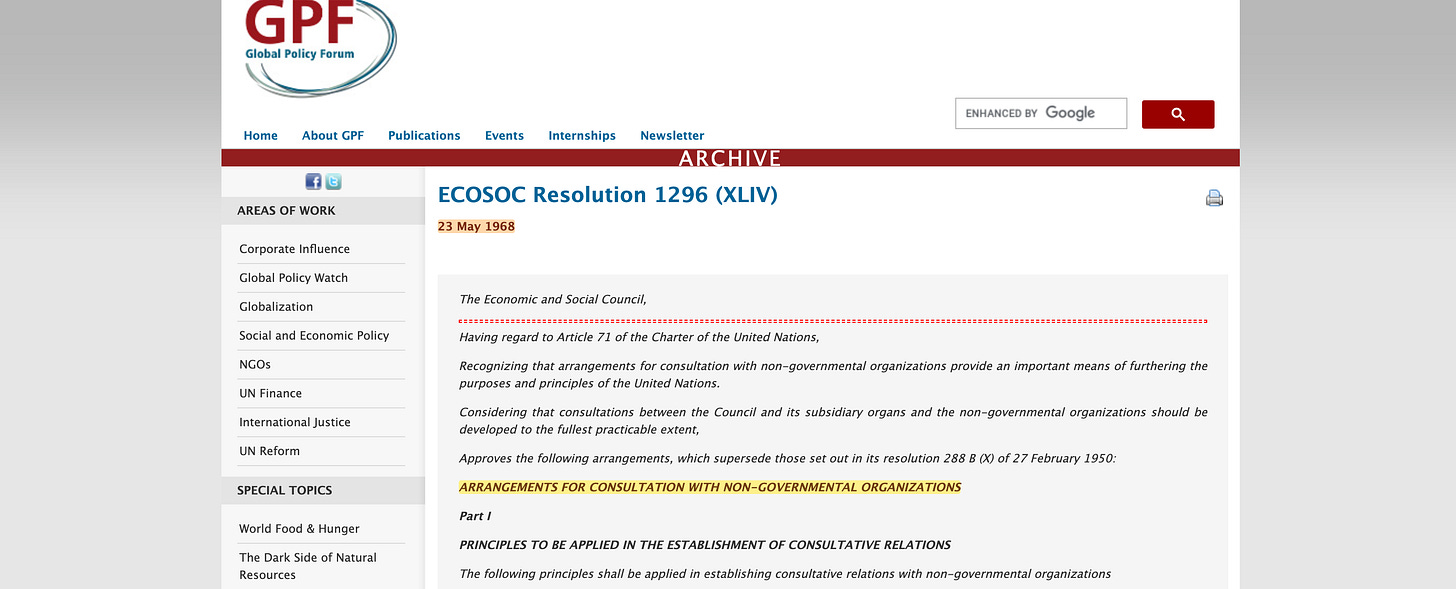

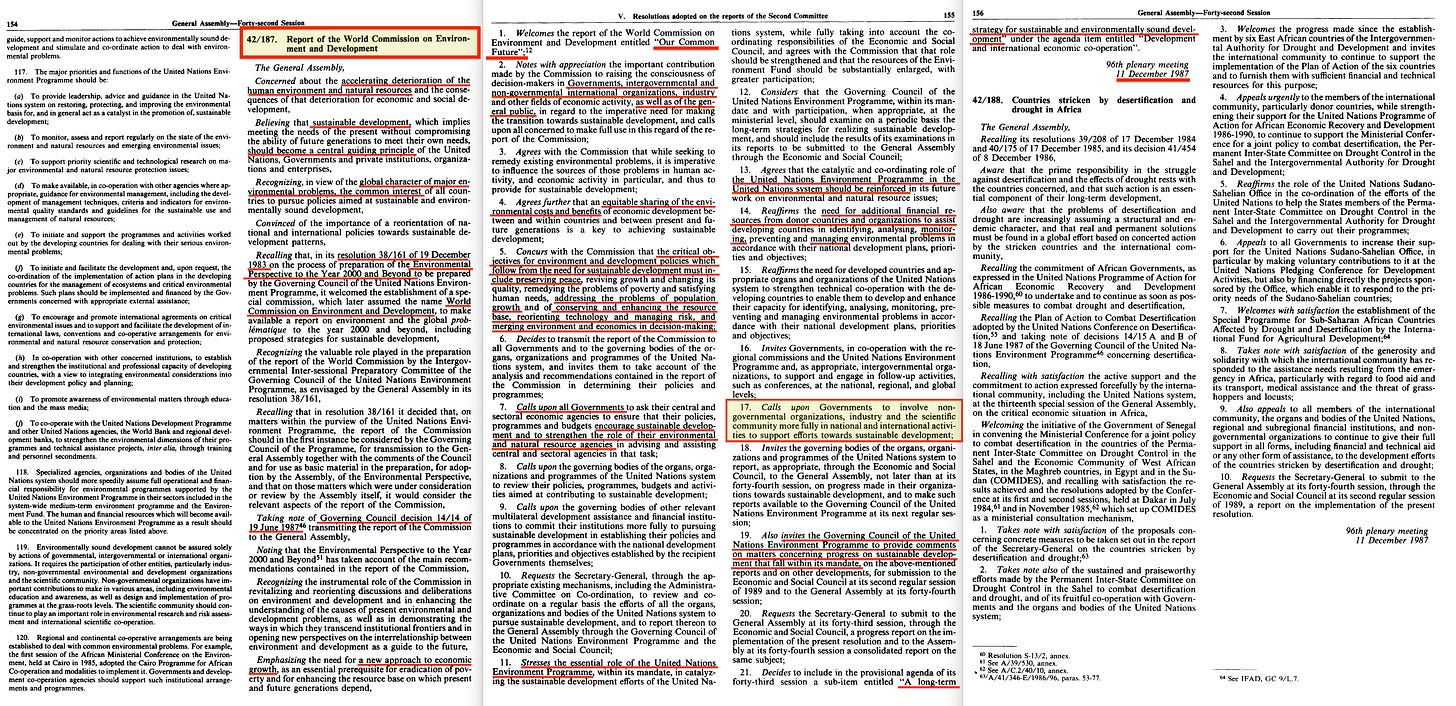
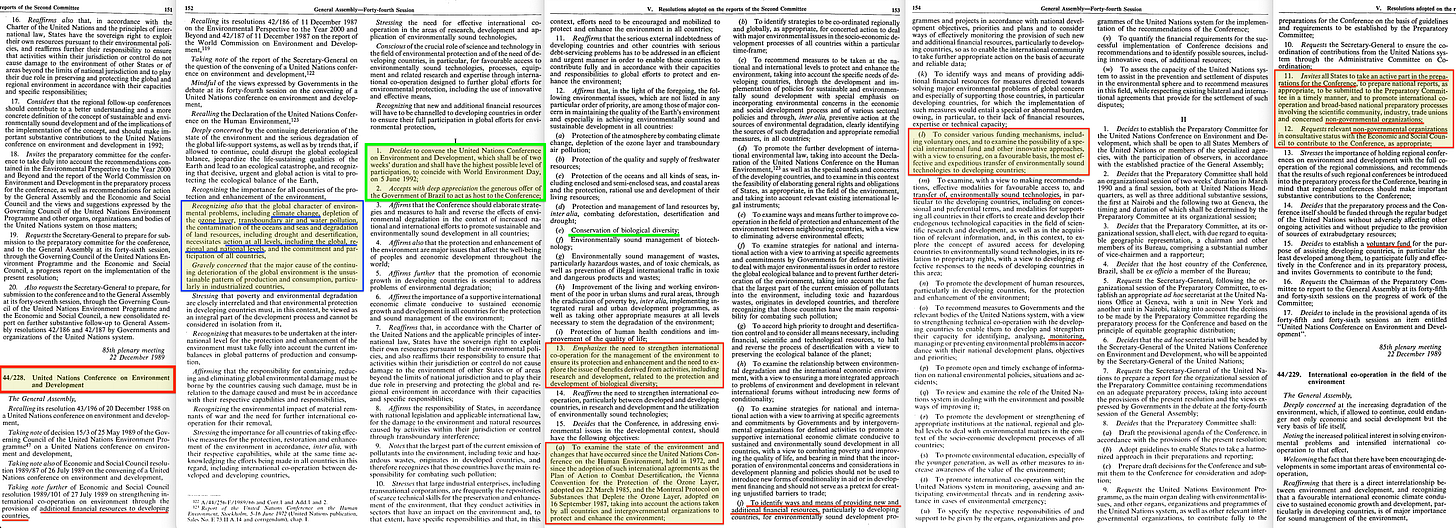
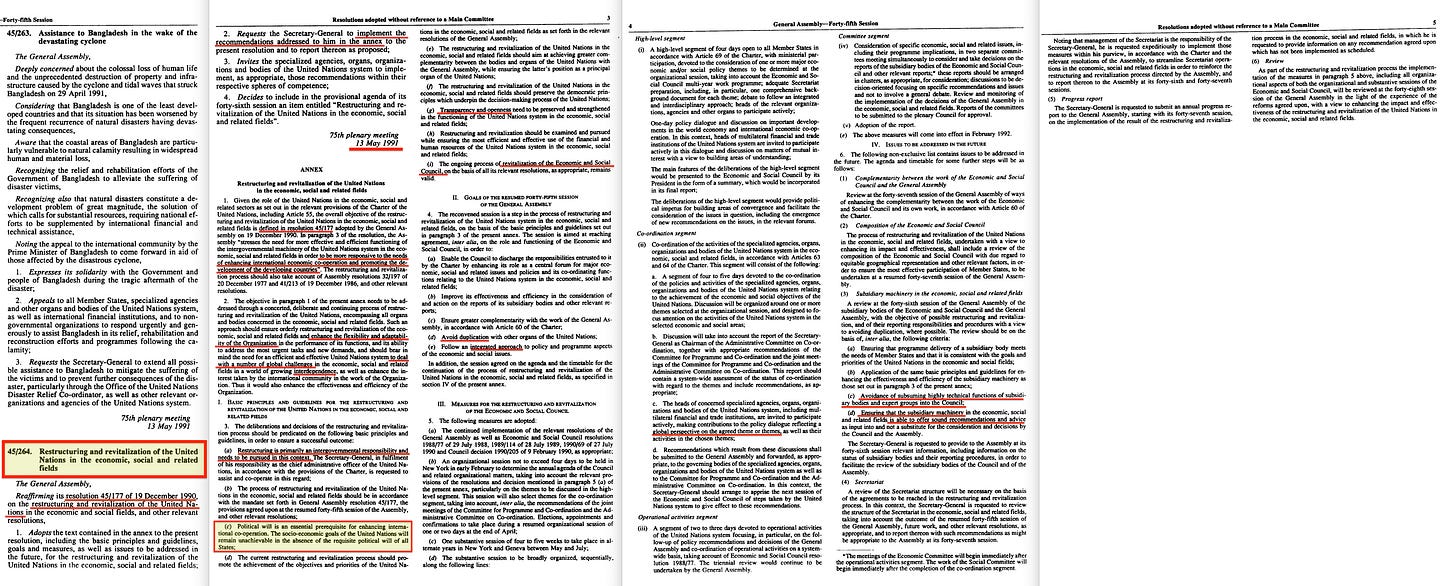














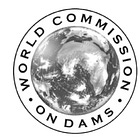






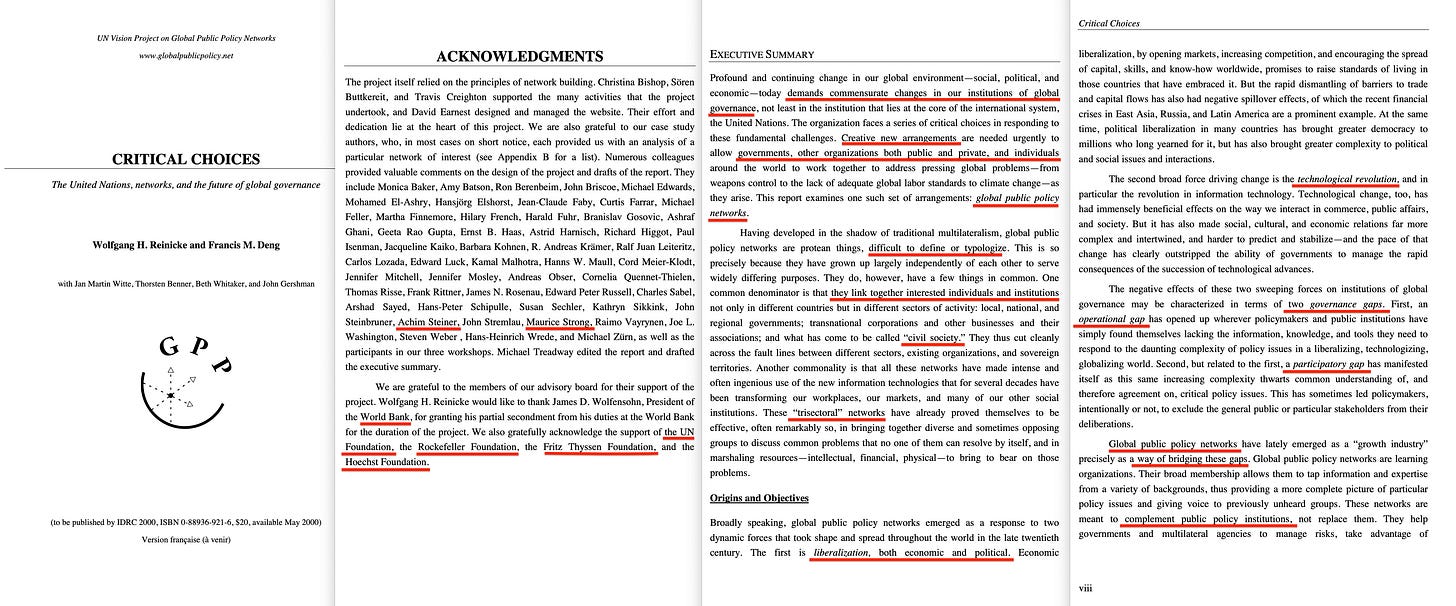

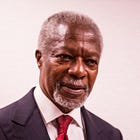
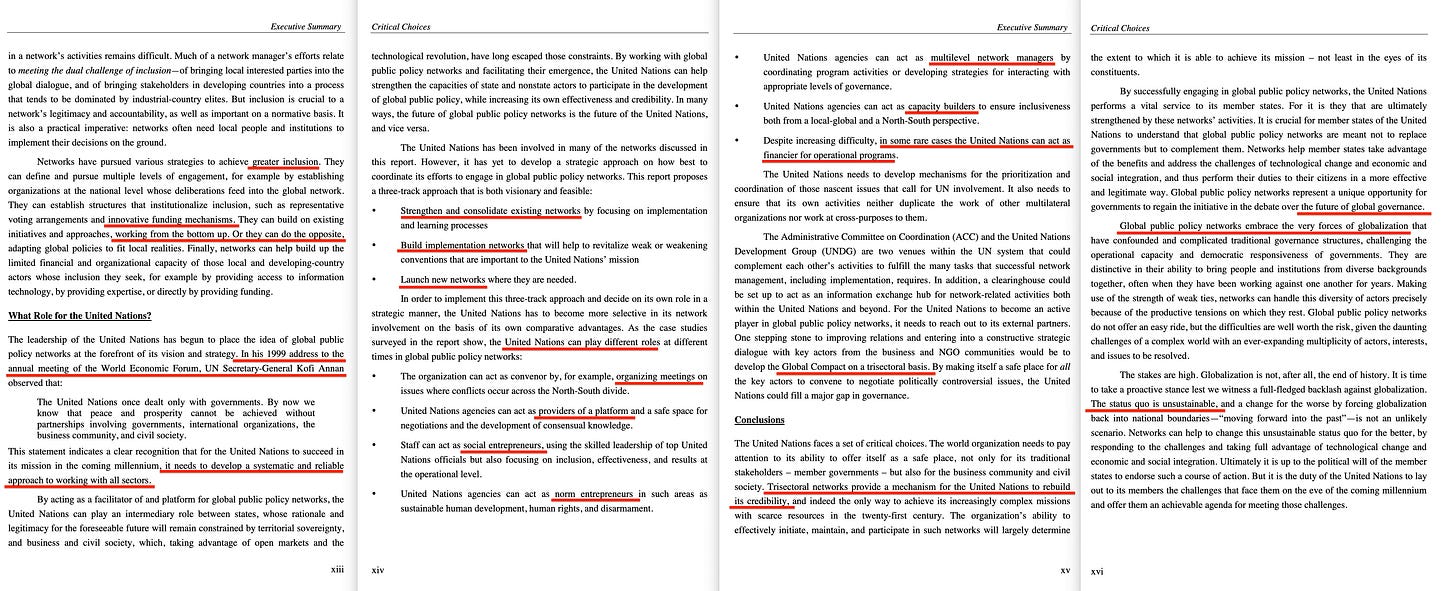



Although it may seem like flock of goats streaming into the barn each seeking the best fodder in a feeeding frenzy, it makes you wonder why the farmers are steering the goats into the barnhouse. To take the comparison to an even more questionable level: will the goats be milked, slaughtered, or do the farmers just want a clean stable? They've got enough milk or meat I presume. Can it be just force of habit?